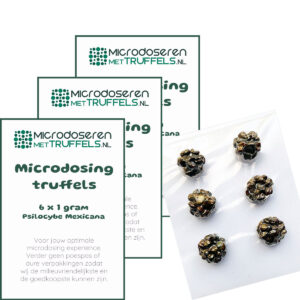Microdosing with Truffles.com | Scientific research
Scientific research
What does science say about microdosing with truffles?
Scientific research
More and more scientific research is being conducted worldwide when it comes to the safety and applicability of psychedelic truffles.
Several studies have been conducted, two of which we would like to highlight.
At the bottom of this page you will find the Carhart-Harris study published in The Lancet Psychiatry in 2016. But now first a Dutch study.
Order your Microdosing Truffles Now
Top quality + lowest price
Dutch scientific research
The research conducted by Van Amsterdam, J., Rensenbrink, N., Van den Berg, J., & Van der Gouwe, D. in 2021 focuses on the safety of psychedelic truffles and includes a retrospective analysis of six years of reports to the Dutch Poisoning Information Center (NVIC). The goal of the study is to gain insight into the potential risks and side effects associated with truffle use, as well as the severity of these incidents.
The study is based on data collected between 2013 and 2019, during which NVIC analyzed reports of truffle-related incidents. The study includes a detailed evaluation of reported symptoms, severity of cases and medical interventions taken. Key findings and conclusions from the study are discussed below.
No incidents
The retrospective analysis shows that there were 307 reports of truffle-related incidents to the NVIC during the period studied. These were incidents of people who had bought truffles independently in smartshops and had consumed them without professional supervision and in a personal, sociable atmosphere. Remarkably, the majority of these reports (94%) were classified as not serious. This indicates a predominantly low risk profile associated with the use of psychedelic truffles.
The most commonly reported symptoms were nausea, vomiting, anxiety and panic attacks. However, these symptoms were generally classified as mild to moderate. Serious side effects, such as severe psychological disturbances or physical complications, were significantly less frequent and were reported in only a small number of cases.
The majority of reports did not require medical intervention. Of the 307 reports, only 16 cases (5.2%) were considered serious and required medical treatment. This suggests that the vast majority of truffle-related incidents do not require urgent medical intervention.
Sensitivity to psychedelic substances
However, researchers stress that it is important to recognize that individual sensitivity to psychedelic substances may vary and some people may be more susceptible to unwanted side effects. Therefore, they recommend taking precautions, such as dosing carefully and creating a safe and supportive environment for those using truffles.
The findings of this study add to the growing body of scientific knowledge on the safety of psychedelic truffles. The results underscore that truffle use can generally be considered safe, with a low risk of serious side effects, especially in the case of microdosing. Nevertheless, the study also emphasizes the importance of responsible use and adherence to guidelines for minimizing incidents.
Neuroplasticity and potential for therapy
Foreign scientific research on depression
The study conducted by Carhart-Harris in 2016, published in The Lancet Psychiatry, examined the feasibility and possible efficacy of psilocybin, a psychedelic compound found in certain truffles and mushrooms, as a complementary treatment for patients with treatment-resistant depression.
The study involved an open-label study, meaning that both researchers and participants were aware of the treatment being administered. The study involved 12 participants who had all previously received treatments for depression but did not respond adequately to them.
Treatment consisted of two sessions of psilocybin at one-week intervals, with each session taking place in a controlled and supportive environment with experienced therapists. Psychological support was provided throughout the sessions to guide participants through their experiences.
The results of the study showed promising findings. After treatment, significant improvements were observed in participants’ depressive symptoms as measured by standardized clinical assessments. These improvements were reported and persisted until follow-up visits that occurred after three months.
Brain activity changed positively
Moreover, neuroimaging data showed that participants’ brain activity changed after the psilocybin sessions, with patterns associated with improvements in mood and well-being. This points to possible neurological mechanisms behind the observed therapeutic effects.
However, the study emphasizes that this was a feasibility study with a limited sample size and that further clinical trials with larger numbers of participants are needed to fully evaluate the efficacy and safety of psilocybin as a treatment for depression.
The findings of this study suggest that psilocybin, in combination with psychological support, may be a promising approach to treating patients with treatment-resistant depression. The results indicate the potential of psychedelics as a complementary treatment option for this difficult-to-treat condition. The study adds to the growing body of evidence highlighting the therapeutic potential of psychedelic compounds and encourages further research in this area.
Microdosing with truffles can also contribute to this change in brain activity that can improve mood and well-being and bring out creativity and connection with yourself. You may also be able to experience more feeling and shake off stress more easily.


